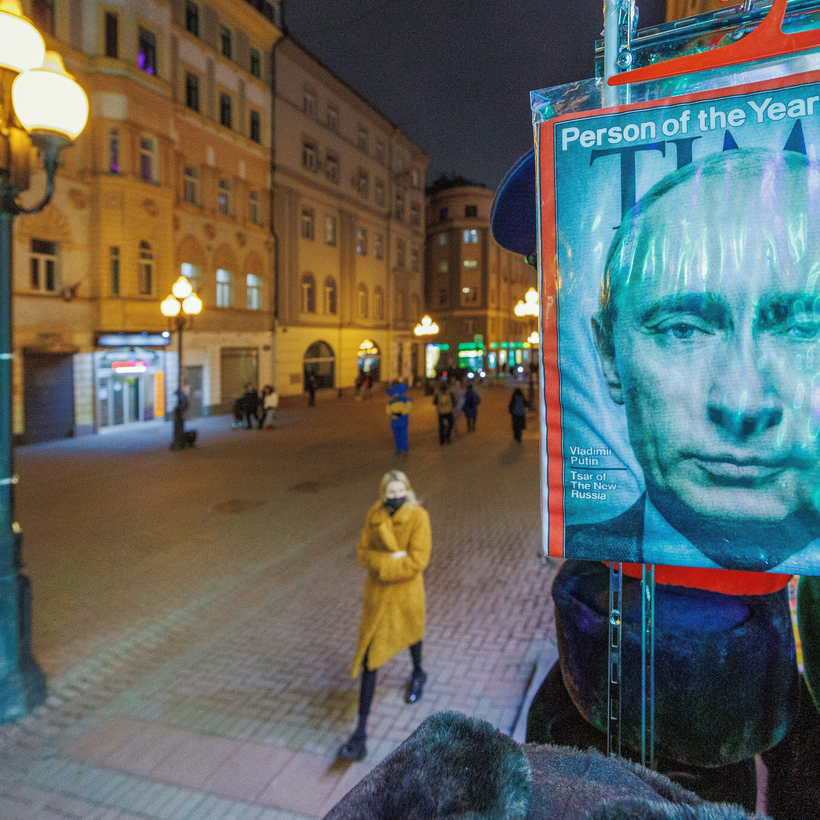“Great to hear he’s not stuck in a Siberian gulag.”
“I’ve heard people don’t even have food over there.”
“Get out while you still can.”
These are some of the comments I’ve heard recently in conversations about Russia. With anti-Putin sentiment running high in the West, people are beginning to picture the country as if it were back in the Soviet era, with store shelves and morale stripped bare.
There have been reports of people standing in line for hours to get their hands on staples such as sugar and buckwheat. News photos have shown product rationing in supermarkets. As inflation creeps up on the ruble, the West is already envisioning Russia slipping into Depression-esque deprivation.
How could Russians not be suffering the twin effects of a nearby war, one that its own men are fighting, and sanctions imposed by the much of the rest of the world?

Yet, for most citizens in Moscow and St. Petersburg, life is more normal than The Washington Post’s recent photographs of an empty Stoleshnikov Lane might suggest. “There are a lot of people who still don’t believe that something bad is really happening,” says Alina, a 21-year-old Russian woman who lives in St. Petersburg, “because, for now, the shelves are not empty. There are no lines.”
In the big cities, the only lines are seemingly for luxury stores. “Yesterday I went to Tsum,” the Harrods of Moscow, “and it was packed like an egg,” says 54-year-old Italian expat Luca.
“When a crisis is happening very slowly,” as it is in Russia, where inflation is inching up by single percentage points, as opposed to Ukraine, which practically became a combat zone overnight, “people tend to not notice there are problems,” says Katya, a 26-year-old teacher living in Moscow. “People go to cafés; people drink coffee; people buy things.”
The cost of dissent is high, and Russians who oppose the war—or just want to stay off the government’s radar—are acutely careful to avoid scrutiny, which explains why none of the people I spoke to wanted to be identified by name. Alina says she is scared of using Instagram for fear her V.P.N. will be tracked.
But for those who are well-to-do and willing to keep their heads down, life in Russia is good. Restaurants are buzzing. Nightclubs are packed. Netflix, contrary to rumors (and a company statement), still works for some people. And while everyone may be thinking the same thing—that theirs is a precarious bubble, one that will inevitably pop—no one’s saying it.
“There are a lot of people who still don’t believe that something bad is really happening.”
While major companies such as Apple and L’Oréal have suspended operations in Russia, nothing so far has made a palpable difference—especially for Russians, who even before the war in Ukraine were used to finding work-arounds for sanctioned items.
“There’s an enormous Dolce & Gabbana stand [at Tsum],” Luca says. For the time being, Dolce & Gabbana has not announced any changes in company policy with regard to Russia. According to Luca, even the luxury brands that have made statements about Russia are continuing to sell their existing stock.
Chanel, meanwhile, announced it would not sell to Russians unless they can prove they live outside the country, which seems like more of an invitation for Russians who can afford the luxury bags to take advantage of loopholes than anything else, though some customers have been vocal in their criticism of the brand.
Other foreign businesses such as Nestlé and Danone have refused to pull out of Russia, instead releasing placating statements that they have, for instance, suspended “the vast majority of business,” paused new investments, or “investigated all options on the table” as to not directly support Russia.
Coke, Lay’s potato chips, and Philip Morris cigarettes are all still readily available in Russia. (That is, while supplies last—Coca Cola, Lay’s, and Philip Morris have all stated they will pull out of the country in the past week.)
On the luxury-supermarket chain Azbuka Vkusa’s Web site, home delivery brings Italian prosciutto, tomatoes, and foie gras to people’s doorsteps. Ivan Rorato, an Italian chef who owns the restaurant La Bellezza in Moscow, told the Corriere Della Sera that life in Russia is better than life in Rome. He added that Russian-produced burrata “is fantastic; it has nothing to envy the Italian one.”
The Russian e-commerce Web sites Ozon and Wildberries are selling Nike sneakers in different colors and sizes, and the same goes for Puma and Adidas. (All three fitness companies released statements suspending retail operations, although Nike recently admitted that some independent stores remained open.) Calvin Klein underwear, Chanel perfumes, Marc Jacobs sunglasses—they’re all there.

According to Katya, however, waiting to order items online is a bad idea. “On Ozon, I put a [pair of] Nike[s] in my cart [last night] and they went up a third of the price by morning.” Still, the understanding seems to be that when one thing runs out, people will simply move on to the next.
Some companies, such as Colgate, say they sell only “essential health and hygiene products”—toothpaste and toothbrushes—which conveniently make up the bulk of their merchandise. Burger King and McDonald’s have not completely closed in Russia. (While both companies have put out statements shutting down all of their Russian locations, rogue franchises have remained open.)
On March 6, Netflix announced it would “stop streaming in Russia.” But the craftier TV junkies are keeping up with the new season of Bridgerton. Netflix “just deducted next month’s fee” this month, says Luca, so it still streams. (This was not true for Katya, who, like Luca, has a Russian account.) John, a 26-year-old American living in St. Petersburg, says his Netflix, which is linked to a foreign account, still works.
Even iPhones, according to Kristina, a 35-year-old businesswoman who lives in Moscow, are in stock. Though Apple stores are closed, “the official distributor of Apple [in Russia],” called Re:store, “is still [open],” Kristina says. “We can buy any product from Apple,” just “for a higher price due to the increase of dollar rate.”
The Four Seasons in Moscow is still open, too. When I sent a message to the concierge, from New York, the hotel replied, “We look forward to welcoming you.”
And Russians are still going on vacation. Kristina notes that the destinations that are easy to reach for Russians—the Altai mountains in Southern Siberia, the Black Sea resort of Sochi, China, the Maldives—“are booming now.” As Anya, a 22-year-old Russian woman who lives in London, says, “Dubai has become like a fucking Russian colony.”
With Emirates, Qatar Airways, Air Serbia, and Turkish Airlines still operating in and out of Moscow’s Sheremetyevo and Vnukovo International Airports, Russians can travel to Athens, Rome, Paris, or any other Western city via a quick stopover in Dubai, Doha, Belgrade or Istanbul. Those traveling from St. Petersburg “usually cross the land border into Estonia or Finland,” John says.
Via V.P.N., fashionable people are still posting photos to social media from Café Pushkin, Moscow’s historic, chandeliered restaurant. (Instagram, Facebook, and Twitter still work, though censors are quick to delete any anti-Russia posts.) Others post from the white-tableclothed Dr. Zhivago, where crêpes with raspberries and Veuve Clicquot are served. A particularly evocative Instagram video sees a group of people at a club, surrounded by belly dancers.
Alongside many of these glamorous on-the-town posts are captions along the lines of “Enjoying the little things.” One person quotes Alice in Wonderland: “Here we must run as fast as we can, just to stay in place. And if you wish to go anywhere you must run twice as fast as that.”
“The best way I can describe it is [that] reality is not realistic,” Alina says. “We are living in a simulation. We are living in a bubble of propaganda.”
“Everything is bright … and clean,” says Katya. “But if you look carefully … some closed shops still have the lights on, like someone just fled five minutes ago. Many of the Guerlain and Tom Ford perfume bottles are empty on the stands.
“It’s apocalyptic,” she says.
On the luxury-supermarket chain Azbuka Vkusa’s Web site, home delivery brings Italian prosciutto, tomatoes, and foie gras to people’s doorsteps.
As the war drags on, the divide between those who are for the war, those who are against it, and those who are simply more interested in preserving their lifestyles than taking political sides is deepening.
“As a protester, I try to persuade as many people as I can to protest,” Katya says. “We had class gaps before this, and now it will become even bigger.”

Fearing military drafts, some young men have fled to Istanbul. Those who are pro-war—of which there are many more than you’d think, according to a recent poll that put Putin’s approval rating at 83 percent—are hanging Russian flags outside their houses, or taking them into the streets.
And those who are not in either camp but simply want to live their lives are living them to the fullest, bracing for what’s to come. The longer Putin wages war on Ukraine, the more likely it will be that the country sinks into Cold War–style isolation. In the meantime, though, Russians will be enjoying an afternoon espresso and vodka with friends.
“If you still have money, you can pretend you live as you used to live,” Katya says. “Though I don’t know for how much time.”
Elena Clavarino is an Associate Editor for AIR MAIL


